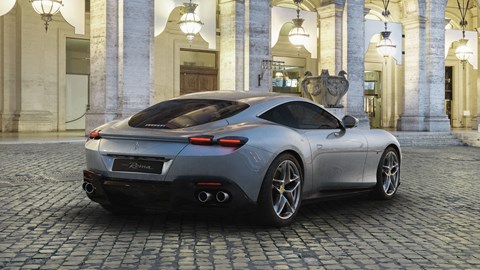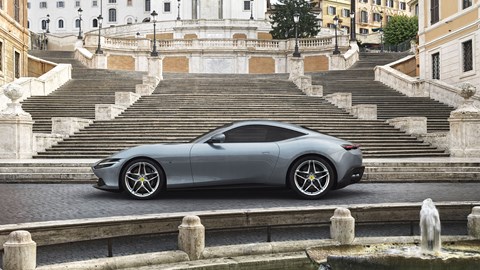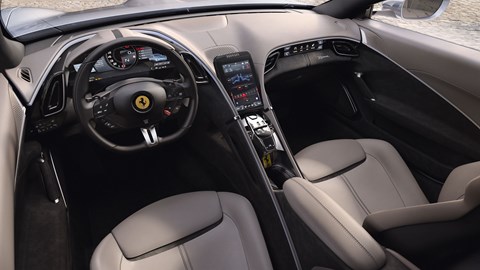► Front-engined hardtop weighs in at an estimated £180k and 611bhp
► All-new infotainment and cockpit
► Based on the Portofino but lower, lighter, faster
Ferrari has unveiled the Roma, a new front/mid-engined coupe with 2+ seating (even Ferrari isn’t claiming anyone can fit in the two rear seats…). The car uses a heavily modified Portofino spaceframe and a new version of the twin-turbo V8 that debuted in the mid-engined 488. Priced at just over 200,000 Euros in Italy (expect a UK price around £180k), the Roma will reach first customers next summer. It is nothing less than the fifth new car Maranello’s introduced this year, and fleshes out the less expensive end of a range now capped by the mid-engined hybrid V8 SF90 Stradale.
We’ve driven it! Read our Roma review
How much Portofino is there in the Roma?
Ferrari is adamant the Roma isn’t simply a coupe version of its existing folding hardtop, but the parallels are clear; same fundamental mechanical architecture, closely-related engine, same wheelbase (2670mm). Key differences are a new interior, complete with SF90-derived driver’s display and touchscreen interface, the all-new aluminium body and a new transaxle gearbox. The eight-speed twin clutch unit is related to that of the SF90 Stradale, and is both 6kg lighter than the Portofino’s seven-speeder and capable of faster and more comfortable shifts.

What’s under the hood?
The Roma’s engine is a reworked version of the twin-turbo V8 that debuted in the 488 GTB, and has since been crowned engine of the year no less than four times. It’s a sublime engine, one that wears its forced induction lightly, with a searing, almost naturally-aspirated rush to the redline absent in many turbocharged V8s.
The unit’s been worked over pretty substantially for the Roma, delivering a 30-35bhp power increase, though some of that’s been negated by the need to meet new emissions regulations, and to fit petrol particulate filters in the exhausts. Peak output is 611bhp at 7500rpm. The Portofino taps out at 592bhp.
The engine work runs to new cams with increased lift, reduced back-pressure in the exhausts and new sensors in the turbos, able to precisely monitor the turbines’ speed and therefore let Ferrari safely wring more from them without showering the engine bay with shrapnel. As well as reclaiming the power lost to the new particulate filters, chief technical officer Michael Leiters also claims the exhaust sound has survived intact.
While the Roma’s platform is hybrid-compatible, Ferrari is at pains to point out it has no plans to offer a hybrid Roma.
Soft ‘n’ bouncy GT or front-engined sports car?
Naturally, Ferrari is adamant that the Roma is both. ‘The difference between the two is quite theoretical,’ explains Leiters. ‘In the past, a GT was a sports car you could use every day. That’s exactly what we have in the Roma.’

He also refutes suggestions that his team’s done little more than pop a roof on the Portofino. ‘The architecture is shared with Portofino but 70% of the chassis and the spaceframe is new or substantially modified,’ says Leiters. ‘The spaceframe is 10% stiffer than the Portofino’s, plus you have the roof bringing additional stiffness. Of course, we worked to reduce the weight as well increase the stiffness. [Ferrari claims a 1570kg kerb weight for the Roma, versus 1664kg for the folding hard-top Portofino]. The spring and damping rates are different also, because of the reduced weight and lower centre of gravity.’
With its engine pushed right back in the nose, for a front/mid-engined layout, the Roma promises to be a serious driving tool, despite the GT billing. Likely to feature adaptive dampers as standard in the UK, the car also boasts a lower centre of gravity than the Portofino and less weight to hold it back. In line with the car’s billing as a Ferrari for people previously too afraid to buy a Ferrari, the Roma also gets Ferrari’s latest suite of assistance systems; Side Slip Control 6.0 and Ferrari Dynamic Enhancer, to keep giddy pilots out of the wall while also making Gilles Villeneuves of all of us.
And the inside story?
The all new cabin uses a twin cockpit theme, with snug environs for both driver and front passenger, with the passenger also getting their own digital display. The drivers gets Ferrari’s new, more digitised steering wheel and the ultra-crisp new driver’s display, a multi-function, very beautiful 16-inch cluster with three-dimensional curvature and the ability to show the standard Ferrari display – giant rev counter, flanked by everything else – or, for example, a giant map instead, a la Audi Virtual Cockpit.
On the centre console you’ll find the 8.4-inch vertical touchscreen. This similarly crisp interface debuted on the SF90, and sits above a neat layout of powertrain controls designed to echo the old open gate of Ferrari’s great manual ’boxes.

The two rear seats are firmly occasional use only, with the back of the driver’s seat already up against their leading edge if the driver’s even remotely tall.
What’s the competition?
Tricky. Fans of the weather – good and bad – will look to the Portofino, or wait for the new Porsche 911 Turbo S convertible perhaps. Think front/mid-engined and you think of Aston’s (significantly cheaper) Vantage, which weighs 1530kg dry with all the light-weighting options in place, versus 1472kg for the Roma without fluids. The standard Vantage uses a 503bhp AMG-sourced twin-turbo V8 and can sprint 0-62mph in 3.6sec, and the £150k Vantage AMR is no more powerful and actually slower to 62mph in manual guise. Like the Roma, the DB11 is a front/mid-engined 2+2. It comes in £150k, 503bhp V8 or £175k, 630bhp V12 AMR flavours.
Then there are the two-seat, mid-engined options, notably the idiosyncratically Honda NSX hybrid and McLaren’s new GT, which is close on price, makes more power and weighs about the same as the Ferrari Roma, but lacks the second row of seats.